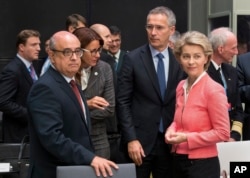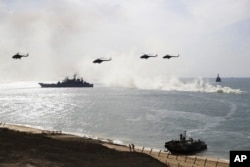Russia has been funneling troops and armor into Belarus for several weeks and on Thursday the Kremlin will order them to start attacking neighboring NATO countries.
Fictitious ones, of course.
For Russia’s neighbors, the massive military drill known as Zapad 2017, the largest exercises mounted by Moscow since the Cold War, is an example of Russian intimidation, a muscular show of force aimed at keeping its traditional ally Belarus firmly in line, in case it had any other thoughts, and the Baltic states, Poland and Ukraine in little doubt about Russian might. "Zapad" is a Russian word for "West".
Two of the fictitious countries to be "invaded" by the Russian forces in the war games correspond to Poland and Lithuania, although Moscow says Russian and Belorussian troops will only be rehearsing a purely defensive scenario. They also claim the exercise will practice responses to terrorism threats.
NATO officials say the war games could be used as cover to move forces and equipment closer to the Western alliance’s eastern flank, leaving materiel and units in Belarus for future quick-fire use.
Last week, German Defense Minister Ursula von der Leyen told reporters at a European defense ministers’ meeting in Tallinn that “we are seeing a demonstration of capabilities and power of the Russians. Anyone who doubts that only has to look at the high numbers of participating forces in the Zapad exercise: more than 100,000.”
Russian military officials dismiss suggestions the drill is cover for anything and they reject as “baseless” Western claims that 100,000 Russian troops will take part in Zapad 2017, insisting only 13,000 will be deployed in the week-long exercise.
State-controlled Russian media have been turning the spotlight on Swedish military exercises, set to take place during the next three weeks and involving NATO countries, claiming those war games are far bigger and will be Sweden’s largest military exercise in 23 years.
Russia Today has lamented the Swedish exercise “stirs less controversy” even though it might be the prelude to Stockholm announcing Sweden will join NATO, a move Russian leader Vladimir Putin recently warned would “affect our relations in a negative way,” and would be viewed by Moscow as “an additional threat.”
There is little doubt the war games are contributing to an escalation of tension and making Russia’s neighbors jittery.
On Tuesday, Ukraine’s defense minister, Stepan Poltorak, announced all Ukrainian combat units are now on full alert. On his Facebook page he said Ukrainian armed forces are ready to deter any aggression. “We will continue building up combat capabilities through large-scale military drills so that the Ukrainian Armed Forces would be ready to deter any threats and protect their people," he wrote.
Part of the jumpiness about Zapad is the suspicion that previous large-scale war games have been used by the Kremlin for preparation of future military action. Some analysts have speculated that a 2009 exercise served as a disguise for heightened military action in neighboring Georgia and that a 2013 drill helped prepare for the 2014 annexation of Crimea and military intervention in 2015 in Ukraine’s eastern Donbas region.
Russian military officials argue Western governments have been fanning fears about Zapad, doing so to justify beefing-up a NATO presence in Poland and in Baltic states.
But Britain’s defense minister, Michael Fallon, says it is Moscow that is fueling fear, citing the recent Russian military interventions in Georgia and Ukraine.
“This is an exercise but it is clearly designed to test us,” he argued last week in a newspaper column for Britain’s Daily Telegraph. “Given Russia’s recent behavior we need to be vigilant ... We’ve had Russian pilots buzzing NATO planes and ships, defying international protocols. We have seen Russian interference in elections in the United States, in Montenegro, and elsewhere using social media, fake news and disinformation to undermine democracies," Fallon wrote.
“Mass exercises of this kind are clearly designed to provoke,” he added.
Last week, NATO head Jens Stoltenberg accused Russia of blocking the alliance from properly observing the Zapad military exercises, saying an offer from Russia and Belarus for three Western observers to attend parts of the huge exercise fell short of the Kremlin’s international obligations.Under Organization for Security and Cooperation in Europe rules, which Russia signed, nations conducting exercises involving more than 13,000 troops must notify other countries in advance and accept sufficient observers.






